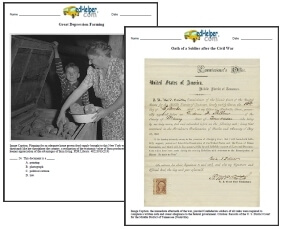
Worksheets and No Prep Teaching Resources
Reading Comprehension Worksheets
Colonial America (1492-1776)

Colonial America (1492-1776)
 Worksheets and No Prep Teaching Resources Reading Comprehension Worksheets Colonial America (1492-1776) |
 Colonial America (1492-1776) |
| edHelper's suggested reading level: | grades 7 to 9 | |
| Flesch-Kincaid grade level: | 8.83 |
|
The First Americans
By Sharon Fabian |

|
 1 When the first European settlers arrived in America, they found wide-open spaces. It looked like an abundance of free land, theirs for the taking. Soon, more and more settlers were crossing the Atlantic to take advantage of the free land.
1 When the first European settlers arrived in America, they found wide-open spaces. It looked like an abundance of free land, theirs for the taking. Soon, more and more settlers were crossing the Atlantic to take advantage of the free land. |
Create Weekly Reading Books
Prepare for an entire week at once! |
| Leave your feedback on The First Americans (use this link if you found an error in the story) |
 |
Colonial America (1492-1776)
|
 |
United States
|
|
|
 | Fifty States Theme Unit |
 |
Document Based Activities |